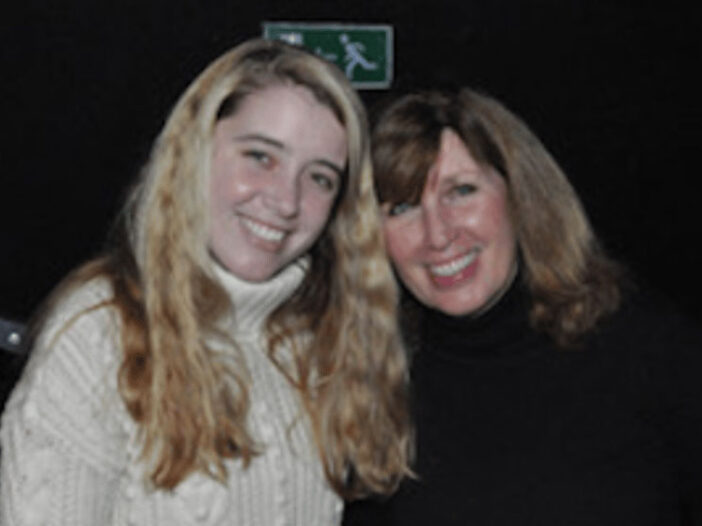
Our returning Blog Ambassador, Kasey Seymour, who underwent double lung transplant surgery in 2016, shares her struggle with anxiety, depression and taking control of her mental health…
Cystic Fibrosis is an invisible disease, for the most part, you can’t tell we are sick. To most people we look like everyone else, it isn’t until our lung function starts to decline that the “invisibility” wears off and you can see our thinning frames, and the shudder of our chests with every breath. But for many of us CF is not the only invisible disease that we fight every day, for many of us the stress of living with a terminal illness also means living with mental illness.
Growing up my mental health wasn’t something that my parents and I worried about. For the most part I was able to keep up with my friends and family, sure I had to take a few more pills and do treatments, but otherwise I was like everyone else. It wasn’t until college when my health started to deteriorate, and IV antibiotics weren’t working like they used to that my family started to notice other changes in me. I began to experience more anxiety, not just about my health but about other things in life. That’s when my mom suggested I “talk to someone”. For some reason I had it in my head that I was fine, that I didn’t need help or therapy. I had handled all the pressures of CF and being a “normal” kid growing up, I was convinced that I would be able to continue to handle it all. It wasn’t until I was hospitalized my sophomore year of college that I finally admitted I needed help. It started within the first few weeks after I returned from winter break, I knew I was getting sick, but I tried to power through.
 Kasey and two of her best friends. “This was the weekend after I had my first struggle with suicidal thoughts. I was still struggling with those thoughts during this outing.”
Kasey and two of her best friends. “This was the weekend after I had my first struggle with suicidal thoughts. I was still struggling with those thoughts during this outing.”
Like most times that I have tried to push through but CF pushed back I was admitted to the hospital. While in the hospital my doctors thought that I was putting too much pressure on myself and that I should think about dropping some classes and think about graduating in 5 years instead of 4. As someone who hated playing the CF card I was categorically opposed to the idea, and I insisted that I could do it all. So, my doctors and I came to an agreement, they would support my decision to finish college in four years if I started seeing a therapist. So shortly after I was discharged from the hospital, I had my first appointment with my therapist. For the next five years this woman changed my life! Yet again, mom knew best and talking to someone was exactly what I needed. Therapy helped me understand more about my mental health and keep my anxiety in check.

Pictured: Kasey says “I was suffering with my first bough of depression. My family and I had gone back to visit London and I was barely able to speak and hold a conversation.”
A few months after I graduated college everything changed again. My health was deteriorating, but this time it was much worse than ever before. Now my doctors were talking about my biggest fear: transplant. Not unlike my sophomore year of college my doctors and I came to an agreement; I would go through all the tests I needed to be listed and I would stop working and in turn they wouldn’t force me to list myself (yet). I agreed. This is the first time in my life I came face to face with the harsh realities of mental illness. My entire life I had one speed and; part of me thought that if I kept working, if I kept moving, CF can’t grab hold of me and bring me down. I was wrong. For the first time in my life, I had to just sit there. “Relax” they said, “this will be good for you” they said. All I saw was everything I had worked for coming crashing down. I lost all motivation to do anything, nothing made me happy, I felt lost. Before I knew it, I was having my first struggle with suicidal thoughts. Thankfully I had a support system in place that was able to jump into action as soon as I opened up. My therapist quickly diagnosed me with depression and suggested to my CF team that I needed to start anti-depressants. What first looked like a simple suggestion turned into a nightmare. Finding the right anti-depressant for me was very difficult, a lot of the medication that I needed to treat the infections in my lungs interacted with the most common anti-depressants. When my CF team realized they were out of their league they sent me to a psychiatrist to help me find the right medication.
Thankfully we were able to find something that helped! Soon I started to feel like myself again, until one night I was watching the news. There was a news report about a terrorist attack in the middle east and suddenly, my mind started racing; “Oh no they are going to attack here next”. At the time I lived in Baltimore in an apartment building near Canton, not somewhere that is A) a hot bed for terrorist activity and B) a target in anyone’s mind. Despite knowing this I couldn’t stop the thoughts of terrorist attacking my apartment building’s pool. Writing it now, its honestly hilarious but in the moment, I could not have been more scared. My heart was racing, my palms were sweaty, it was difficult to breathe. When I told my psychiatrist she was quick to notice the signs of a panic attack. I had never had a panic attack; I didn’t know what that meant. But with my declining health my doctors wanted to alleviate as many problems as they could, so they started me on anti-anxiety medication. Despite all the medications and therapy, as my health continued to fail, my mental health got worse and worse. Panic attacks became a daily occurrence, and my depression went into overdrive with suicidal thoughts becoming more and more persistent. It got to the point that after I had been listed for a few months my family and friends decided that I couldn’t be left alone.

Kasey and her sisters Christmas 2015. “It was the night I realized that I needed a transplant or I would not be there the following year.”
Thankfully on June 9th, 2016, my guardian angel saved me, and I received a double lung transplant. At that point my mental health was the furthest thing from everyone’s mind, I had much bigger issues ahead of me. But as I regained my strength and I learned what it felt like to breathe again, my mental health began to take center stage again. As part of my post-transplant regimen, I was taken off my anti-depressant, but I was allowed to stay on my anti-anxiety medication. There is a part of transplant that no one prepares you for: survivors’ guilt and PTSD. I was left wondering why a young man had to die so I could live. I would cry at the sight of oxygen tubes. I didn’t think I was worth the gift I had been given. It was during this time that I was able to lean on my therapist, she helped me work through a lot of what I was feeling. I don’t think I will ever be “cured” of either issue, but I have the tools to deal with them now.
My depression and anxiety have been very different experiences. There are times when I feel like I have everything under control and there are also times when I know my depression is getting worse. 2020 was the latter. I haven’t been able to work since before my transplant, so the changes of the working world didn’t affect me but a highly infectious that targets the one part of my body that is most susceptible to infection triggered my anxiety in a way that hadn’t happened since pre-transplant. As a CF transplant patient, I have a cough, stuffy nose, difficulty breathing all the time. Because of my sinus issues I haven’t been able to taste or smell anything in years, so obviously I was constantly terrified that I had COVID. That I would end up on a vent again. That I would lose my lungs. Each day presents new challenges, variants, symptoms, and infections, but with the help of my therapist and my medications I have been able to regain some control over my anxiety.
I know that I will struggle with depression, anxiety, survivors’ guilt, and PTSD for the rest of my life. I know there will be times I need medications. I know there will be times I need therapy. But just like fighting CF I know that the only way to fight mental illness is to talk about it. The CF community has made great strides in the last few years to start prioritizing mental health the same way they prioritize physical health; but we still need to do our part. When we are open and able to acknowledge these struggles, we can support each other and get people the help they need, not just for those of us that have CF, but everyone. Mental health may feel like an invisible illness, but the more we share our stories the more visible we can make it.

Kasey surrounded by all her best friends (bridesmaids) during her bridal shower. “What no one knew was that I was suffering through a major anxiety attack. I hate being the center of attention and this was a very triggering moment for me. Thankfully my family pulled through for me a took a lot of the spotlight off me!”


